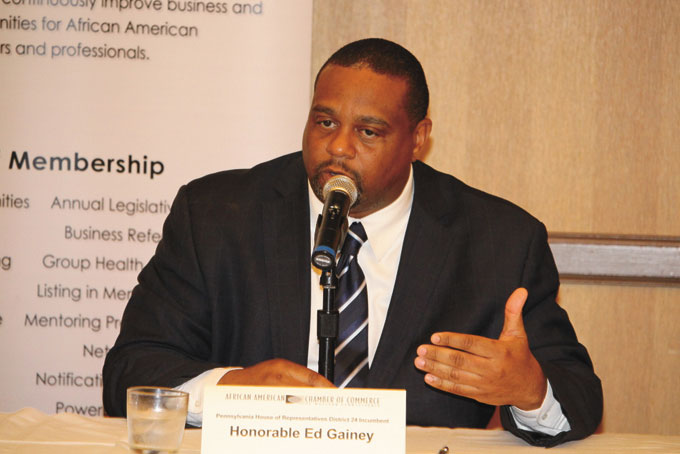
Bringing development experts from state county and municipal levels, state Sen. Jay Costa, D-Wilkinsburg, and state Rep. Ed Gainey, D-East Liberty, held a state policy hearing in Wilkinsburg to seek remedies to the growing problem of blighted properties across the state.
“Blight is a scourge that impedes both business and residential interest in a community,” Costa said.
“We must do what we can to give our municipalities the resources, tools and flexibility they need to quickly eradicate blight and begin revitalization efforts.”
One of those resources, recently approved in Pittsburgh, is landbanking, a process that allows municipalities like Wilkinsburg, with at least 10,000 residents, to acquire blighted properties, clear delinquent taxes and liens, and prepare them for investment and revitalization—all aimed at returning the property to the tax rolls and productive use.
Local governments have the option of joining and must pay 5 percent of yearly delinquent tax collections to help fund the program.
But even smaller Allegheny County communities, Costa said, could benefit by forming entities similar to the Tri-COG Landbank that recently received $1.5 million in start-up funds from the Heinz Endowments.
In addition to landbanks, Matt Madia, chief strategy and development officer for Bridgeway Capital Investment said other resources could be employed, pointing to its revitalization work, that includes a $9.6 million effort to revitalize Homewood He said some of their business loans have resulted in new businesses occupying commercial space that would otherwise be vacant.
Gainey, who co-chaired the hearing with Costa, said the state has passed several laws in recent years aimed at assisting local governments in blight removal and revitalization initiatives.
“There are also numerous proposals under consideration in the legislature that would generate more funding for demolition and revitalization work and toughen penalties against absentee owners,” he said.
Whatever is done, it may need to be done quickly given the grim statistics presented by Urban Redevelopment Authority of Pittsburgh Director Kyra Straussman who noted that a fourth of the city’s footprint is abandoned and vacant property that the government does not control.
“While our tax base is eroding, we are simultaneously directly paying millions in tax dollars annually to keep problem vacant and abandoned property just as it is,” she said.
Others who testified were: Cynthia Whitman Daley, policy director of the PA Housing Alliance; Tracey Evans, executive director of the Wilkinsburg Community Development Corporation; A. William Schenck, TriState Capital Bank Board Member, Pennsylvania Economy League of Greater Pittsburgh; An Lewis, Director, Steel Rivers COG; Daniel Lavelle, board member, Pittsburgh Land Bank; and Liz Kozub, Community Development coordinator, Turtle Creek COG.
State Rep. Paul Costa, D-Braddock, and state Sen. Wayne Fontana, D-Beechview, also attended the hearing.
Like us at https://www.facebook.com/pages/New-Pittsburgh-Courier/143866755628836?ref=hl
Follow @NewPghCourier on Twitter https://twitter.com/NewPghCourier